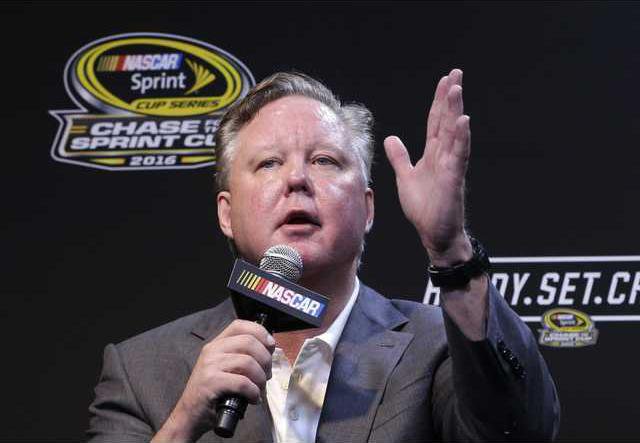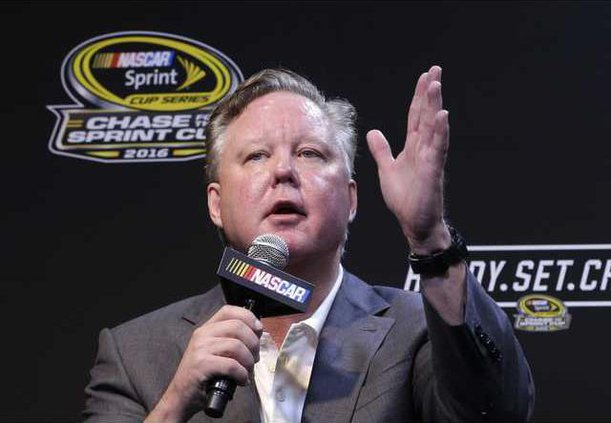CHARLOTTE, N.C. — If NASCAR is for sale, the France family isn't saying.
An attempt to calm employees about the future of the struggling, family owned racing series came Tuesday from NASCAR President Brent Dewar, but his memo said only that there would be no comment on "industry rumors."
It's long whispered that NASCAR could be on the selling block and Chairman Brian France has become dramatically less visible since the end of last season. Most public duties are now handled by Dewar, who addressed employees about a report a day earlier that Goldman Sachs had been retained to explore a potential sale for the France family.
The France family, which owns a majority stake in the nation's top auto racing series, "remains dedicated to the long term growth of our sport," Dewar wrote in the memo obtained by The Associated Press from a person who shared it on condition of anonymity due to the sensitive nature of the topic.
The memo did not specifically address any possible deal by the France family.
"For over 70 years, the France family has worked hard to invest in the sport of NASCAR, including our recent acquisitions of ARCA," Dewar wrote, referring to the recent purchase of the Automobile Racing Series of America, a lower-tier stock car series that sometimes races in conjunction with NASCAR events.
NASCAR has seen ratings and attendance decline in recent seasons and several big-name sponsors have scaled back or pulled out. Lowe's, the only sponsor seven-time champion Jimmie Johnson has had in his 18-year career, is leaving at the end of the season. Home Depot, Target, Subway, Dollar General and scores of other sponsors have already exited racing.
Title sponsor Monster Energy signed just a one-year extension through 2019 and NASCAR has said it is re-evaluating its sponsorship structure.
Team owners seemed surprised by Monday's report from Reuters citing unidentified sources that the family wished to explore a sale. One owner, who spoke to AP only on condition of anonymity, said France firmly told owners in recent months the series was not for sale. Two weeks earlier, at Talladega Superspeedway, a different team owner told AP he believed the family would listen to offers for NASCAR.
Television ratings have continued to drop over the past decade and the retirements of Jeff Gordon, Dale Earnhardt Jr., Tony Stewart, Danica Patrick and Carl Edwards may have contributed to fans tuning out. But at-track attendance has also suffered and the three public companies that own tracks where NASCAR races are held have all reported attendance revenue declines.
Despite its woes, NASCAR remains "one of the strongest brand franchises in America," said Larry Chiagouris, a marketing professor at Pace University if New York. "Seeking to get a measure of its value now is a smart idea because we are witnessing the merging of entertainment and advertising assets at a pace not seen in several years. There could be many potential buyers, particularly media conglomerates and, yes, even some of the tech titans that could incorporate NASCAR into larger marketing and media programs and initiatives."
Greg Portell, lead partner at global consulting firm A.T. Kearney, based in Chicago, said it was possible NASCAR's owners are simply getting feedback on its value. He agreed that private firms or big entertainment companies would make the most sense as a buyer, "an AEG or an IMG."
"From an outsider's view looking at NASCAR, their value proposition to marketers for a long time was, we have great visibility, we have great enthusiastic fans and that's why you should spend money," he said.
"But in today's world, the value is much more around the potential to really create lifestyle marketing. So those drivers and those athletes are no different than movie entertainers or musicians, rock stars, really, and if you look at the way those businesses have gone, companies are really trying to lock up those talents in 360-degree deals. So you can start seeing how they can monetize a driver's likeness on social media, on product merchandise, not just on the brand that goes on the car."
He added: "It would be interesting to someone who knows how to monetize stars, celebrity. ... It doesn't come along very often that you can buy a business that has scale in a very competitive world. It's not like they're buying pro bowling or the darts league or lacrosse. Even Major League Soccer, you have to build that followership. Here, they already have a followership. They reach millions of consumers. And so the question is how do you shine that up a bit and take advantage of it in a new marketing environment that really hasn't been tested by the current ownership."
NASCAR was founded in 1948 by Bill France Sr., and handed down to his sons, Bill France Jr., and Jim. The current structure has Bill France Jr.'s son, Brian, running NASCAR, while his daughter, Lesa, controls International Speedway Corp., the sister company that owns many of the venues. Jim France runs the IMSA sports car series. Lesa France and Jim France remain largely behind the scenes, while Brian France has been the face of the family. The exact ownership stake has never been revealed.
Because of changes made under Brian France's leadership— to the cars, the championship structure, the schedule, the rules, a television package that places some races on cable, and many other updates — the hardcore fan base views him as a polarizing figure.
Brian France has taken a progressive position on diversity and widening it in NASCAR, and he wanted to ban the Confederate flag from race tracks. But he also took a handful of drivers to a rally for President Donald Trump, and later sent employees a memo separating his views from company views.
Corbin Bridge, an associate at InvestmentBank.com, said the timing could be good for a sale with private equity funds eager to invest. Noting that many details are unknown, Bridge suggested a sale of NASCAR would fetch billions but fall short of the $8 billion acquisition of Formula One by Liberty Media in 2016.
The impact of a sale could depend on whether the France family pulls out of NASCAR altogether, Bridge said.
"If it's a complete 100 percent sale to another party and the family walks away, that could have some interesting ramifications that aren't so positive," he said. "If it's a sale where the family stays on for a transition period or if select members stay on to help guide the company and the new owner, kind of helps take the company in new and exciting directions to grow the brand while staying loyal to its mission and current fan base, then it could be a pretty good play for the company and help them in the long run."





